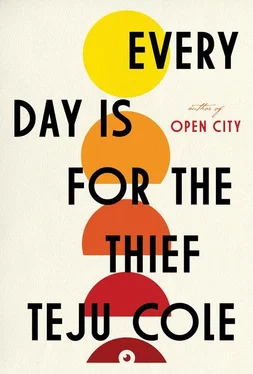Money, dished out in quantities fitting the context, is a social lubricant here. It eases passage even as it maintains hierarchies. Fifty naira for the man who helps you back out from a parking spot, two hundred naira for the police officer who stops you for no good reason in the dead of night, ten thousand for the clearing agent who helps bring your imported crate through customs. For each transaction, there is a suitable amount that helps things on their way. No one else seems to worry, as I do, that the money demanded by someone whose finger hovers over the trigger of an AK-47 is less a tip than a ransom. I feel that my worrying about it is a luxury that few can afford. For many Nigerians, the giving and receiving of bribes, tips, extortion money, or alms — the categories are fluid — is not thought of in moral terms. It is seen either as a mild irritant or as an opportunity. It is a way of getting things done, neither more nor less than what money is there for.
Cash has to change hands, that’s the way of the world. Only in excessive cases, like that of the recently convicted inspector general of police, is it viewed as a blight on the system. Tafa Balogun’s stolen billions deprived many policemen of their livelihood, and this is part, though not all, of the reason they in their turn extort drivers. Yet, the complaint that most people have is not that Balogun stole money. That a high-ranking government official would embezzle public funds is a given. What annoys people is that he stole so much so quickly. The reasoning was that if only he had shown some moderation, taking only a little here and there, he would not have been arrested. The Balogun case is one of the very few brought against a senior official since the national anticorruption campaign began; the day after my arrival in Lagos, the case is concluded. Balogun is found guilty and given six months in jail for the estimated fourteen billion naira he stole. Six months, that is, for a little over a hundred million dollars. There’s no reason, though, for believing that his is the most severe instance of theft. People assume that corruption goes on even at the highest levels of government: contracts, payoffs, oil bunkering. Later, there are rumors in the papers that Tafa Balogun has died in prison. How, why, or when, nobody seems to know. No one seems to mind that he is dead. And when the rumors turn out later to be untrue, that news, too, is met with a shrug.
Most police officers earn between ten and fifteen thousand naira a month. They cannot quite survive on such salaries, which amount to less than one hundred dollars. A friend of my uncle’s, an immigration officer, was once transferred out of state and to a remote area of the country. His refusal to take bribes was affecting his colleagues’ earnings and, by extension, their ability to provide for their families; he had to be sent somewhere where he would be less of a nuisance. Salaries are similarly low in the armed forces, where, also, there is never any guarantee there will be payment. And it is these heavily armed and poorly paid men who are entrusted with the work of protecting the citizenry.
The informal economy is the livelihood of many Lagosians. But corruption, in the form of piracy or of graft, also means that most people remain on the margins. The systems that could lift the majority out of poverty are undercut at every turn. Precisely because everyone takes a shortcut, nothing works and, for this reason, the only way to get anything done is to take another shortcut. The advantage in these situations goes to the highest bidders, those individuals most willing to pay money or to test the limits of the law.
A few minutes after I finally arrive at my aunt and uncle’s house, the electricity goes out. For those who live here, this sudden deprivation is no surprise. It is a nocturnal ritual. But I’m no longer used to it, and I pass the night fitfully, tracing the shadows that flicker tirelessly on the concrete walls. The air is hot, and thick with old ghosts, and with the smell of kerosene.

A gentle music rouses me the next morning: the muezzin’s call to prayer floating across the forested valley that separates the house from the minaret. I rise and pad through the house. Everyone else — my uncle and aunt, my cousins, the servant — is still asleep. The electricity has not been restored yet. Natural light leaks into the living room. I make tea. Cockerels’ crows, from another direction, skitter over the muezzin’s Arabic. A smell of cooking smoke arrives from the distance.
From the back porch of the house is a view into a gorge. The view used to amaze me when I visited this house in the past, and while I was away my thoughts would periodically wander over to it. The gorge is now far from pristine. Trees have been cut down, and tracts of land have been carved out for houses. Ugly buildings in various stages of completion now loom out of it. Clinging to the houses like barnacles are white satellite television dishes. Farther away is a half-built evangelical megachurch. It is a losing battle for the forest. But it is only daybreak, and all is as yet tranquil. I stand on the porch drinking my tea. Viewed from a certain angle, the gorge can still look primeval, can still conform to a certain idea of Africa: no gasoline fumes, no gleaming skyscrapers, no six-lane highways. Africa as bush and thicket. The morning sky is restless. Dark clouds gather in clumps and, little by little, the clumps gradually disappear. Light traces silver lines across the wide sky. I finish my tea and go back inside.
The hallways of the house are bigger than they used to be. The floor is broad and covered with curiously soft white tiles. It is as though I have shrunk in the years since I was last here, or the house itself has gently expanded in the heat, increasing by small amounts in each month of my absence to reach these dimensions. The doorframe is wide and high enough for a family of acrobats to walk through in formation. And there they suddenly are, in my presence, standing on each other’s shoulders, their limbs in astral shape. They negotiate the opening, thread it.
The house, of course, is unchanged. It is smaller only in memory. Memory and the intervening years, many of which I have spent in cramped English flats and American apartments, limitations I have endured like a prince in exile. Now, in the cool interior of this great house in Africa, proper size is restored. No single body could dominate a room in such a house. Even the bathroom dwarfs me. I pass through the door that connects the family room to the passageway time and again, as though to test the portal. And each time, I find its generosity marvelous.
Part of this story has been told before: the broad doorway, the acrobats. These are incidents from a book I love. Incidents, to be exact, from a dream in that book. But is it any less real to me now for having once happened to someone else elsewhere? For having been recorded in print in the dream, twenty-five years ago, of a great writer returning to his ancestors’ Sri Lanka? This is my story now, not his. I am in my aunt’s house, but I make it a substitute for that other house of vanished histories, my demolished childhood home. I gape at the soaring ceiling and look down again, just in time to see the smallest of the acrobats restore her grip. The human star is preserved.
One sign of the newly vital Nigerian economy, and one of the most apparent, is the proliferation of Internet cafes. There had been none when I left home. Now there are several in every neighborhood, and there must be hundreds in Lagos alone. The Internet cafe is symbolic of a connection to goings-on in the larger world, an end to Nigeria’s isolation. It is a connection shared by many other large countries trying to shake off poverty. The availability of computers is, in this sense, an index of progress. But while India is an emerging software player, and countries like China, Indonesia, and Thailand have successfully staked claims in manufacturing, Nigeria’s contribution is much more modest. In fact it is, for now, limited to the repetition of a single creative misuse of the Internet: advance fee fraud.
Читать дальше













